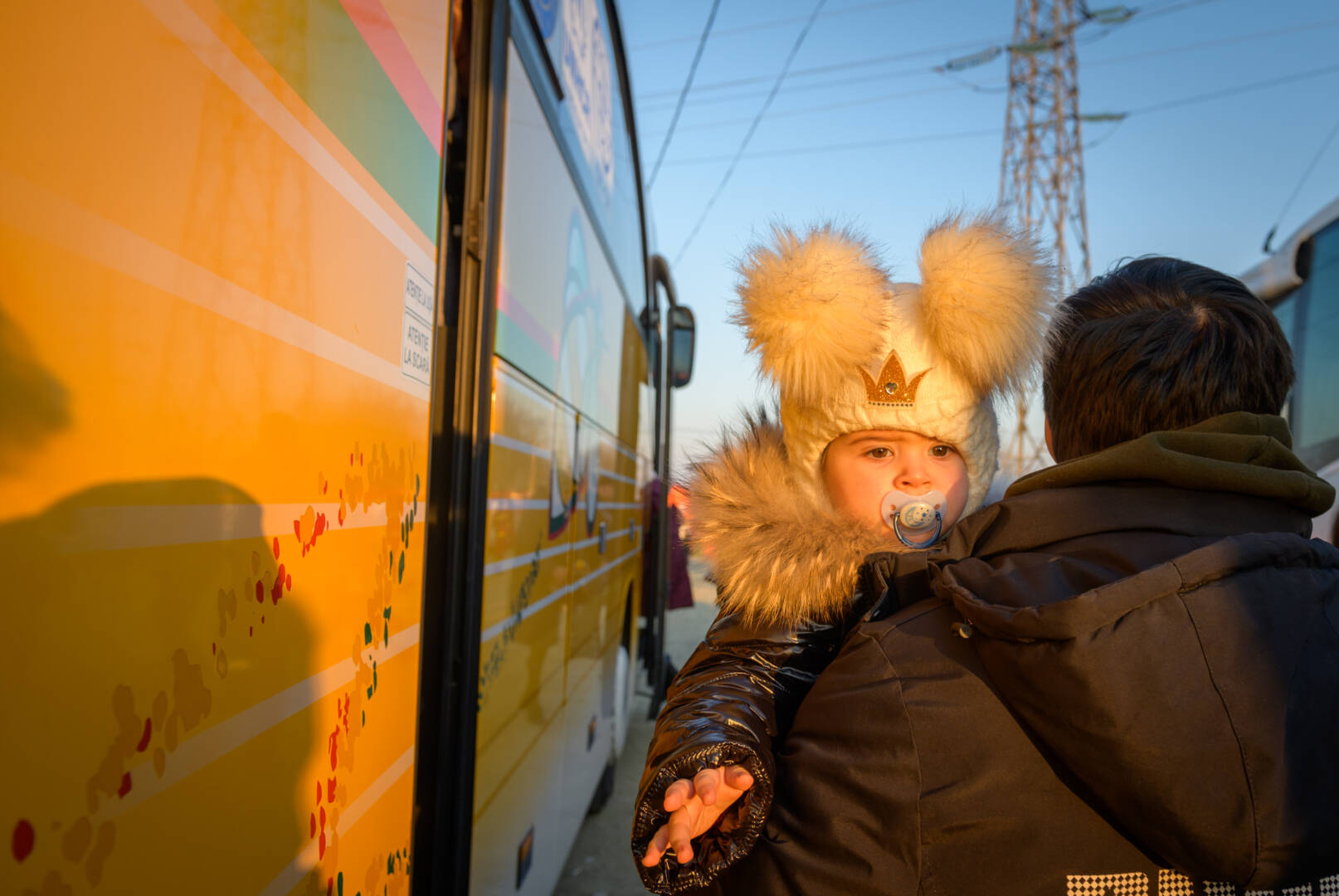As of September, over 7 million refugees from Ukraine have found shelter throughout Europe since the war began on February 24. Most refugees, as well as people displaced within Ukraine, are women and children. Since the onset of the conflict, World Vision has been working in Romania, Moldova, Georgia, and Ukraine through churches and local organizations and with government groups to provide support.
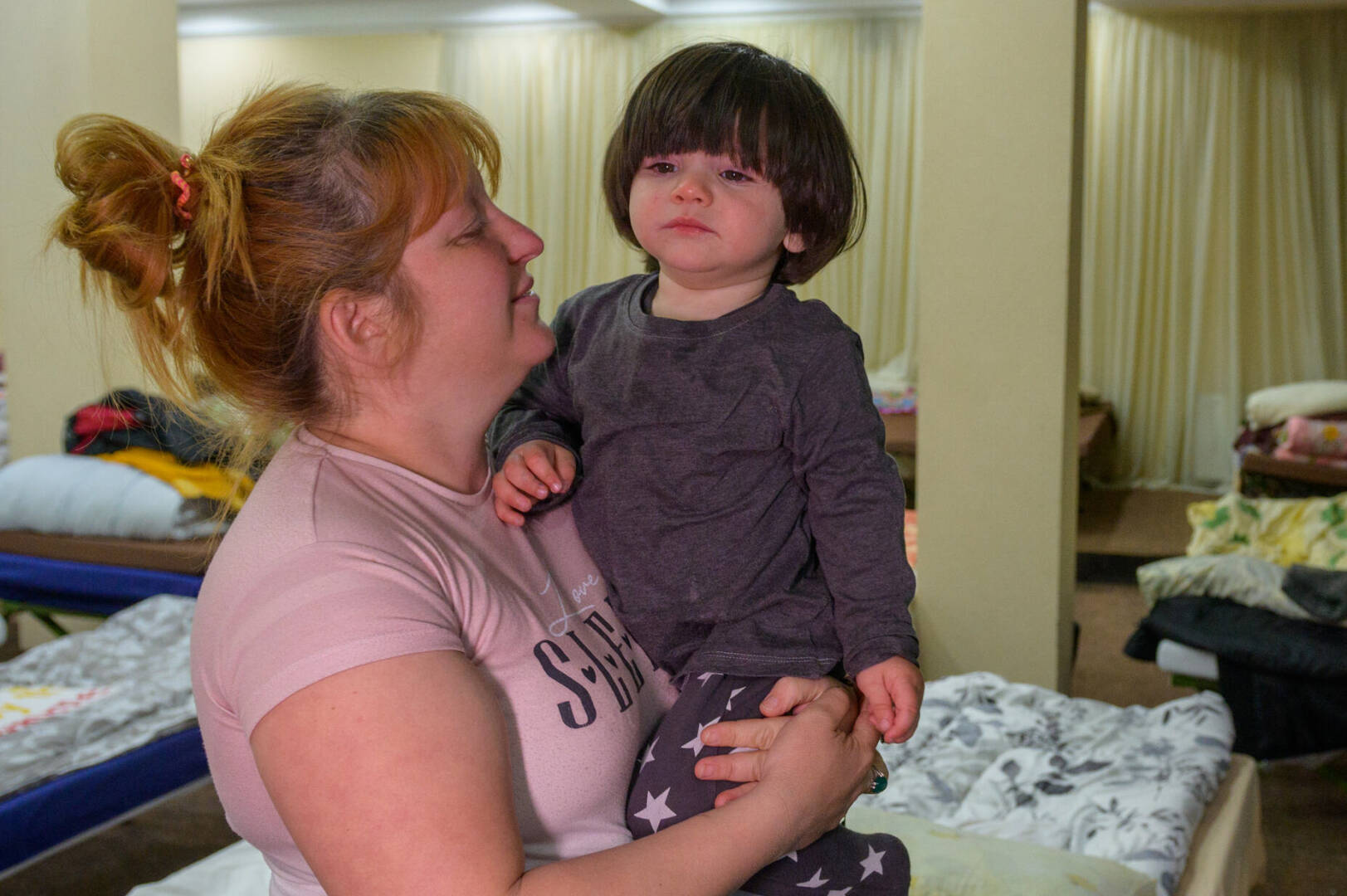
Seven months pregnant, Ana struggled with the idea of leaving her home in Ukraine until finally, she felt she had no choice. As she was out walking with her husband, Oleg, two rockets exploded in the sky over the city center of Mykolaiv where they lived. They knew the time had come for Ana and their 18-month-old son, Leonid, to seek safety. They fled to Moldova as Oleg stayed behind to defend Ukraine, along with most men ages 18 to 60.
Ana saw the explosions’ toll on little Leonid: “For a day and a half, he didn’t get any sleep. The moment he would fall asleep, he would wake up shaking. It was not a place for me to stay, especially [being] pregnant.”
Moldovan doctors felt that Ana could deliver before full term, so she began frantically filling out paperwork so that Oleg would be allowed to leave Ukraine and be with her for their baby’s birth.
Ana and Leonid found shelter at Centrul Crestin Sfanta Treime (Holy Trinity Christian Center) in the city of Chișinău. The church had opened its doors to help refugee families by offering beds, home-cooked meals, and hygiene supplies.
Pastor Alexandru Malancea doesn’t call them refugees, but rather guests. He tells his staff, “I don’t see a person running away from the war. I see Jesus.”
Ana sees that sentiment lived out.
“I feel like I’m home, that I belong here,” says Ana. “We all have one God and we’re here on earth to be able to support each other and to be there for each other.”
Through tears she says she’s grateful that, even though separated, her family members are still alive — that, and thinking about welcoming her soon-to-arrive child keeps her moving forward in this troubled time.
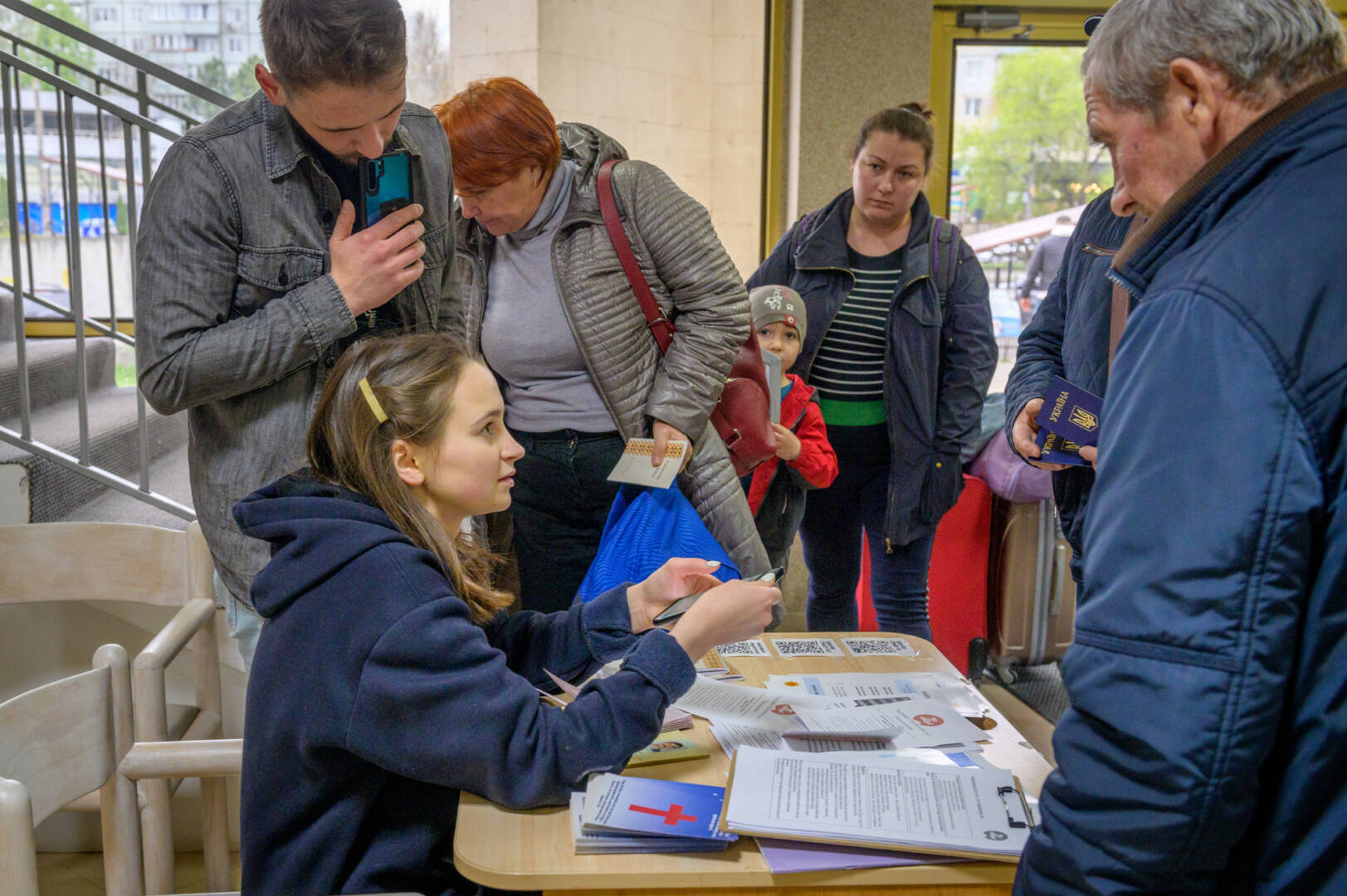
The right place
Television host and Presbyterian minister Mister Rogers famously reminded people to “look for the helpers” in times of trouble. Around the world, many helpers have stepped up to support people fleeing the war in Ukraine. The support comes in ways as varied as the people offering it.
At the church where Ana found shelter, 21-year-old Alina greets arriving refugees with care, kindness, and a shy smile that blesses those receiving it.
Alina says she’s guided by Galatians 6:2, which reads, “Bear one another’s burdens, and so fulfill the law of Christ” (ESV). On staff at the church, she normally works in the library. Now she’s dedicated to helping refugees from Ukraine to feel at home and welcomed.
“It’s a blessing for me to be here,” she says. “God has given me the honor to be here and to serve these people.”
Alina registers refugees and leads them to their beds, which she’s made up with clean sheets. She also helps cook and cleans up after meals.
“What motivates me the most is the people and their stories and what they’re going through,” she says.
She remembers a time in her life when she was so busy and felt herself drifting away from God. Now she’s busier than ever but finds herself closer to God and feels Him working her life.
“I feel a great dose of joy that I can do this,” Alina says. “I think that all this what God wants me to do, and I feel fulfilled as I never felt before.”
Supporting the helpers
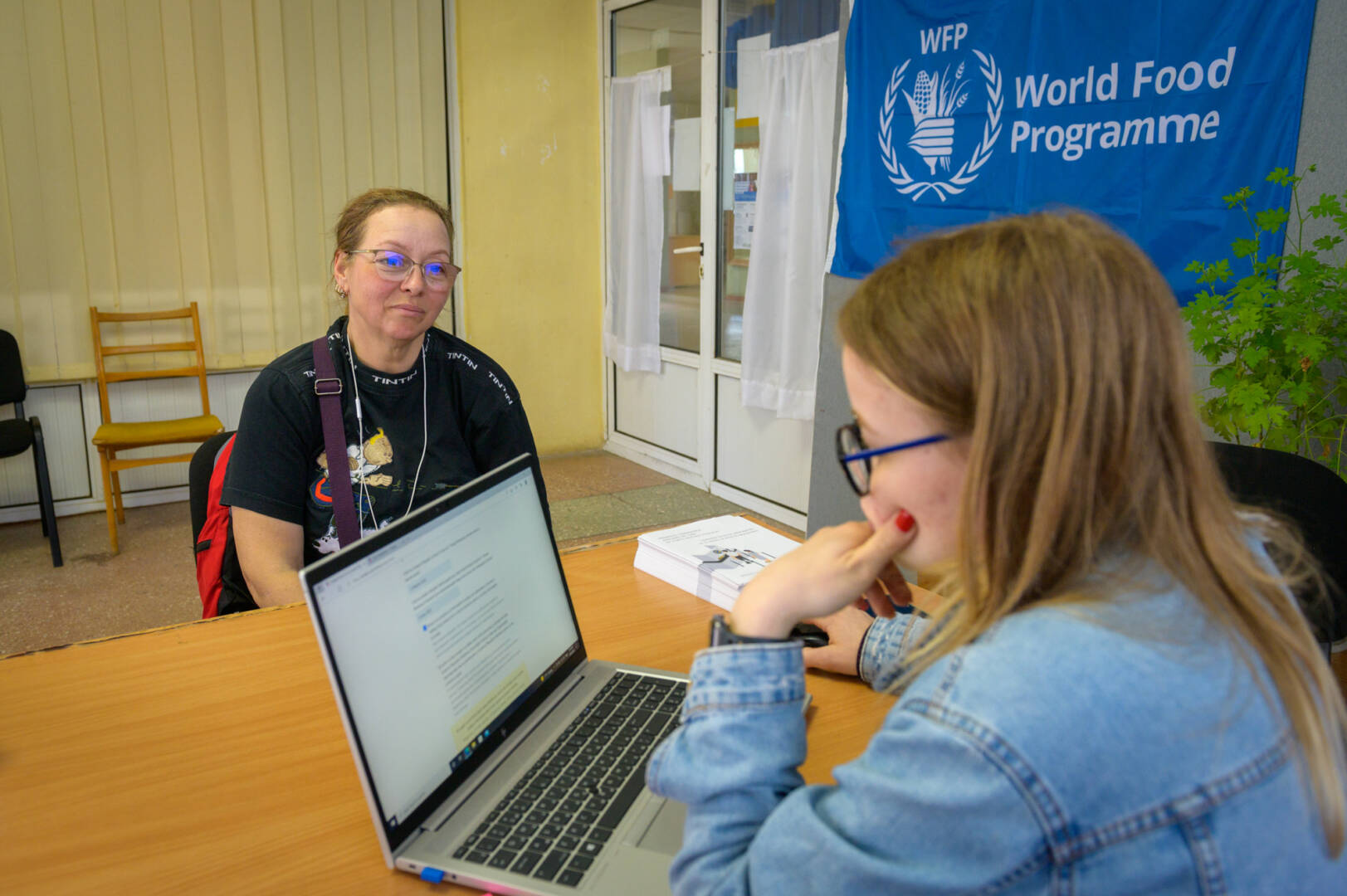
Angelica also finds herself in the right place at the right time. “I think I’m a person who always helps someone who needs it,” she says.
In late February, Angelica began offering shelter to as many as 14 people in her three-bedroom apartment, where she lives with her 19-year-old daughter and 30-year-old son.
In Moldova, the World Food Programme (WFP) has partnered with World Vision to provide a special cash grant to families hosting at least two Ukrainian refugees for more than one week. The program began in April, with each host family receiving 3,500 Moldovan lei (US $190) to help cover expenses.
Angelica learned about the program through the people she was hosting. She was grateful for the assistance because her expenses had risen, especially for electricity and water. The cash can be used on anything the family deems necessary to help in their support of refugees.
Youssef Mhanna, World Vision’s Moldova operations team lead, says, “We know that the majority of this cash grant will be spent on food, but also non-food items … as well [as] paying … utility bills and other invoices.”
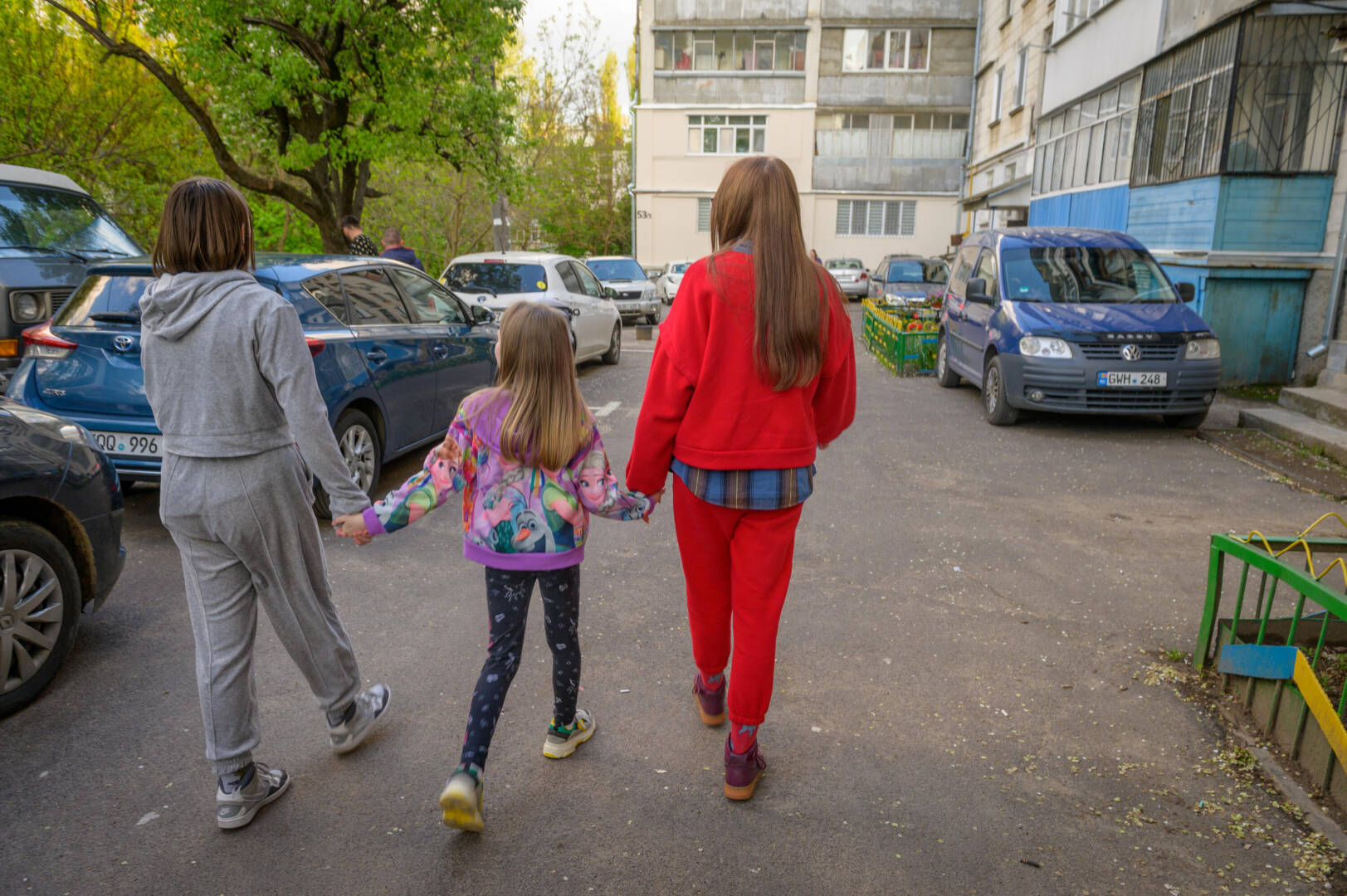
Building an extended family
By April 2022, one family remained in Angelica’s home — a mother and her three daughters. Angelica and her children embraced them. She says, “We do everything together. We cook, clean, go for a walk.” Angelica’s family even included them in their Easter celebration.
Living with Angelica and her kids has offered an extended family to Ukrainian sisters Eugenia, Ana, and Arianna.
“When we were leaving, everything was usually like they show the war [on TV], shooting, bombing,” says 14-year-old Eugenia. “I was very scared. I didn’t know how I would be received.”
In Angelica’s 19-year-old daughter, Elisabeth, Eugenia and Ana found an older sister — someone who helps them navigate the unfamiliar environment of Chișinău. Angelica and Elisabeth babysit the younger girls while their mom works.
Elisabeth’s face lights up as she explains how the girls have also made a dream come true for her. “They helped me to feel like I’m a big sister,” she says. She takes this role seriously by walking with the girls to local parks and helping 9-year-old Ana with her homework.
Elisabeth doesn’t see her family’s generosity as anything extraordinary. “It’s important to help because we are people, and we don’t know what it will be tomorrow,” she says. “Today, I help. Tomorrow, you help.”
Even though Ana and Eugenia miss the family and friends they left behind in Ukraine, they didn’t feel safe once the war began. “I couldn’t sleep well there,” says Eugenia. “I couldn’t go out for a walk, but I can do all these [things] here. I’m happy here.”
Youssef thanks all the Moldovan host families, and stresses the need for continued global support: “We as World Vision appreciate what you are doing. And we will pray for you, and we will try to help you to continue supporting the Ukrainian refugees.”
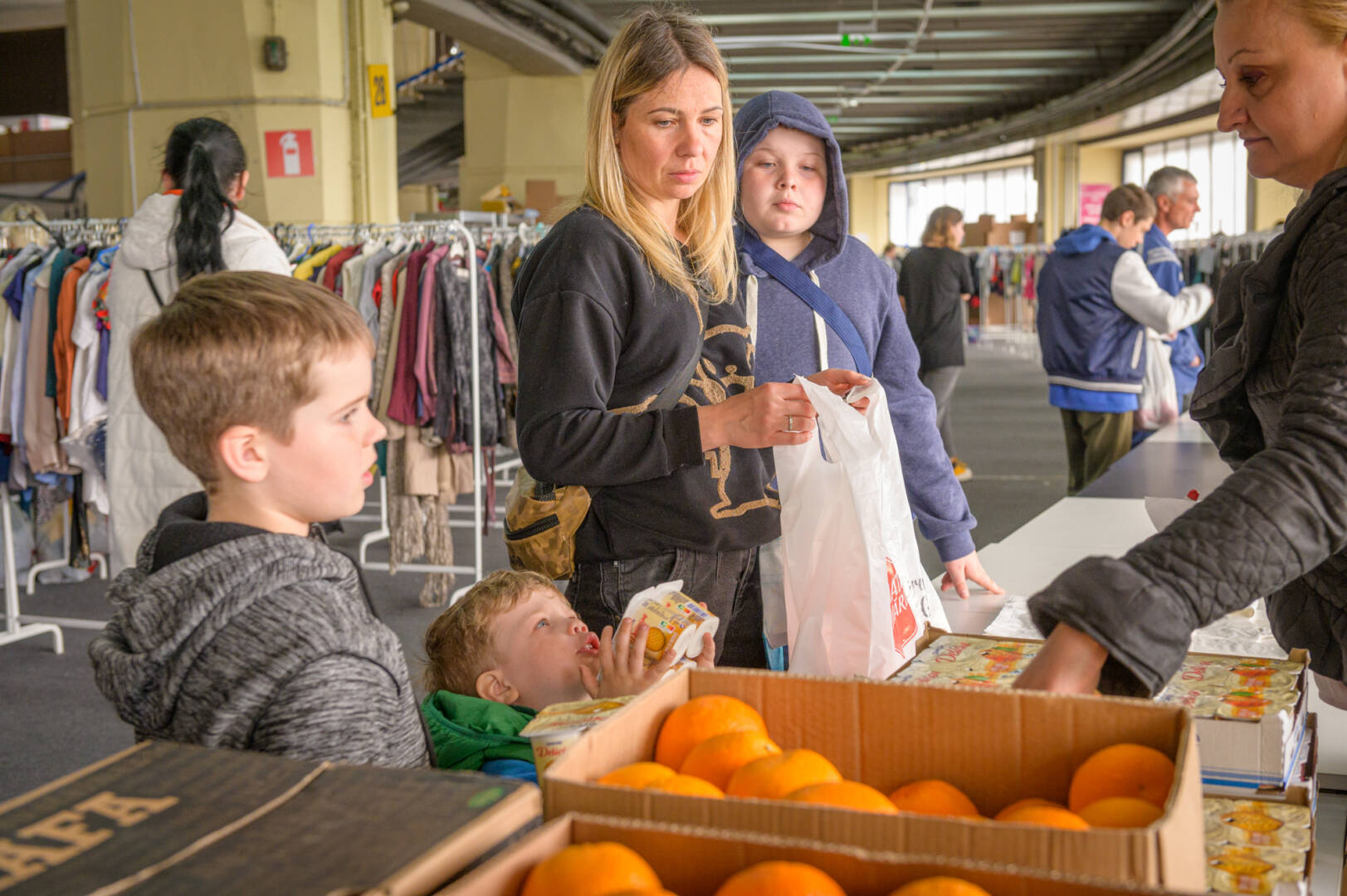
City center community
As the war began, World Vision’s 32 years of experience in Romania offered a solid foundation to partner with the government and local organizations in quickly setting up places for refugees to find help.
One such place was Romexpo — Bucharest’s largest, 2,000-person overflow shelter, but normally an exhibition center and indoor arena.
In April, an average of 900 people were visiting the location each day. World Vision’s emergency logistics director Mark Mitchell explained, “World Vision has been working with Romexpo to provide basic food materials, things like rice and pasta and oil … [along with] hygiene items, feminine hygiene products, diapers for children, etc.”
Families were able to come every 10 days to pick up more supplies.
A place to connect and find normalcy
Understanding the need for connectivity in times of crisis, World Vision worked with a coalition of partners through the Geeks Without Frontiers–led N50 Project to set up the first of 10 Portable Connectivity Centers just outside of the original Romexpo location.
The easily transportable centers, like internet cafés, can charge multiple devices at a time, provide a powerful hotspot, and include laptops, tablets, and smartphones that kids can use to continue their education. Parents can also access vital information on the go.
Tatiana, 36, brought her three sons to the location to pick up food supplies. Her son Ivan had a birthday the next day, and would be turning 13 in a country not his own. But the family received food vouchers and they hoped to get some sushi (Ivan’s wish), then take a walk in a city center park.
“We want to say thank you to everyone who is helping,” says Tatiana. “Thanks for the peace that we find here.”
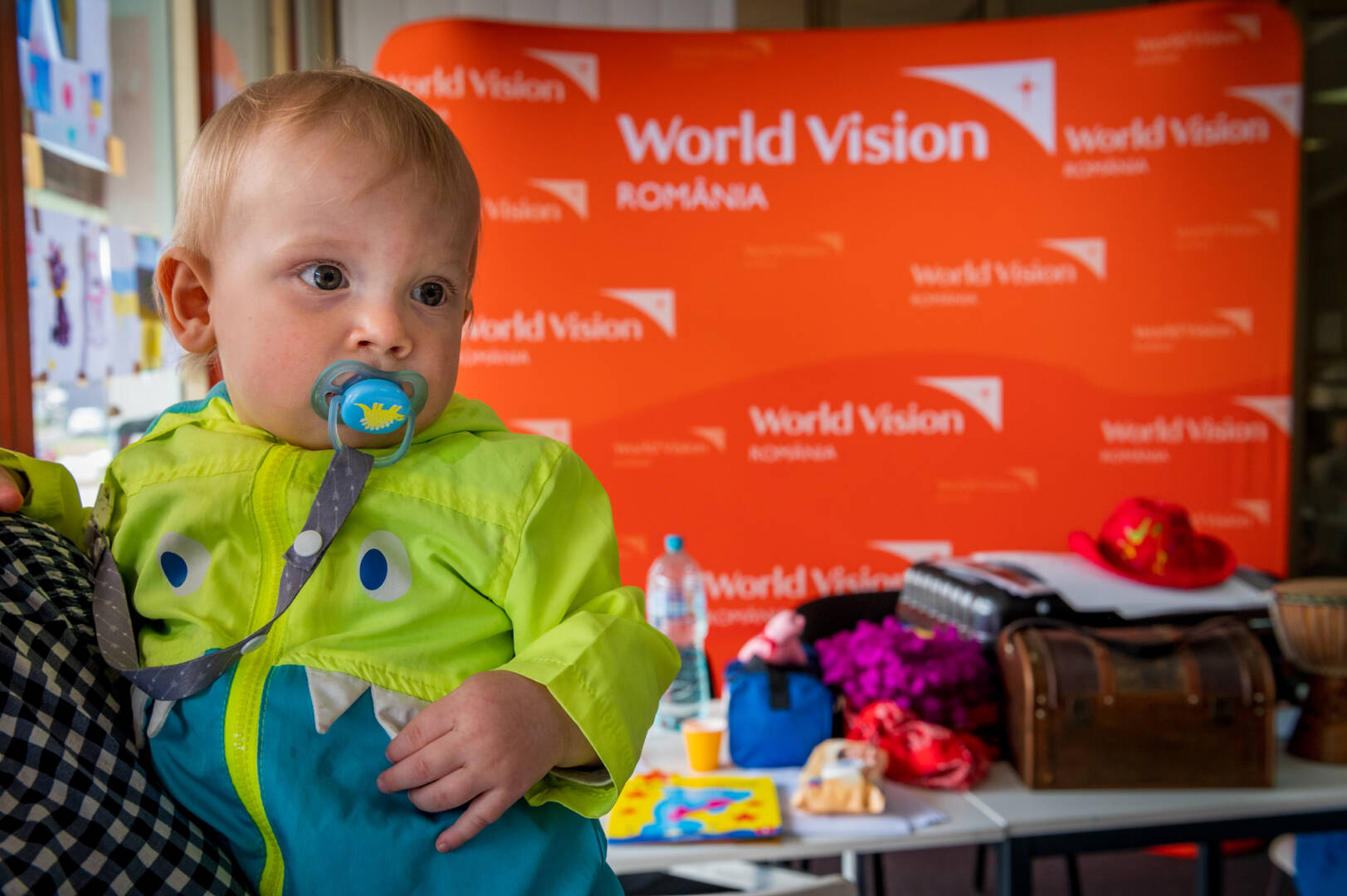
A place to play and catch a breath
World Vision offers a peaceful place through its child-safe play area at Romexpo.
Mark explains that as a child-focused organization, World Vision puts service to kids at the forefront. “Thinking in terms of Romexpo,” he says, “it was important to have a [supervised] space where children can be children and they can play.”
Diana, age 31, came to Romexpo with her 5-year-old daughter, Yeva, and 2-year-old son, Artiom. While she picked up much-needed food supplies, Yeva and Artiom colored and played with toys.
Diana says, “It’s great to have this place here especially because where we live, we don’t have space for kids.”
She added, “We can leave our kids here and walk … without worrying what the kids will do.”
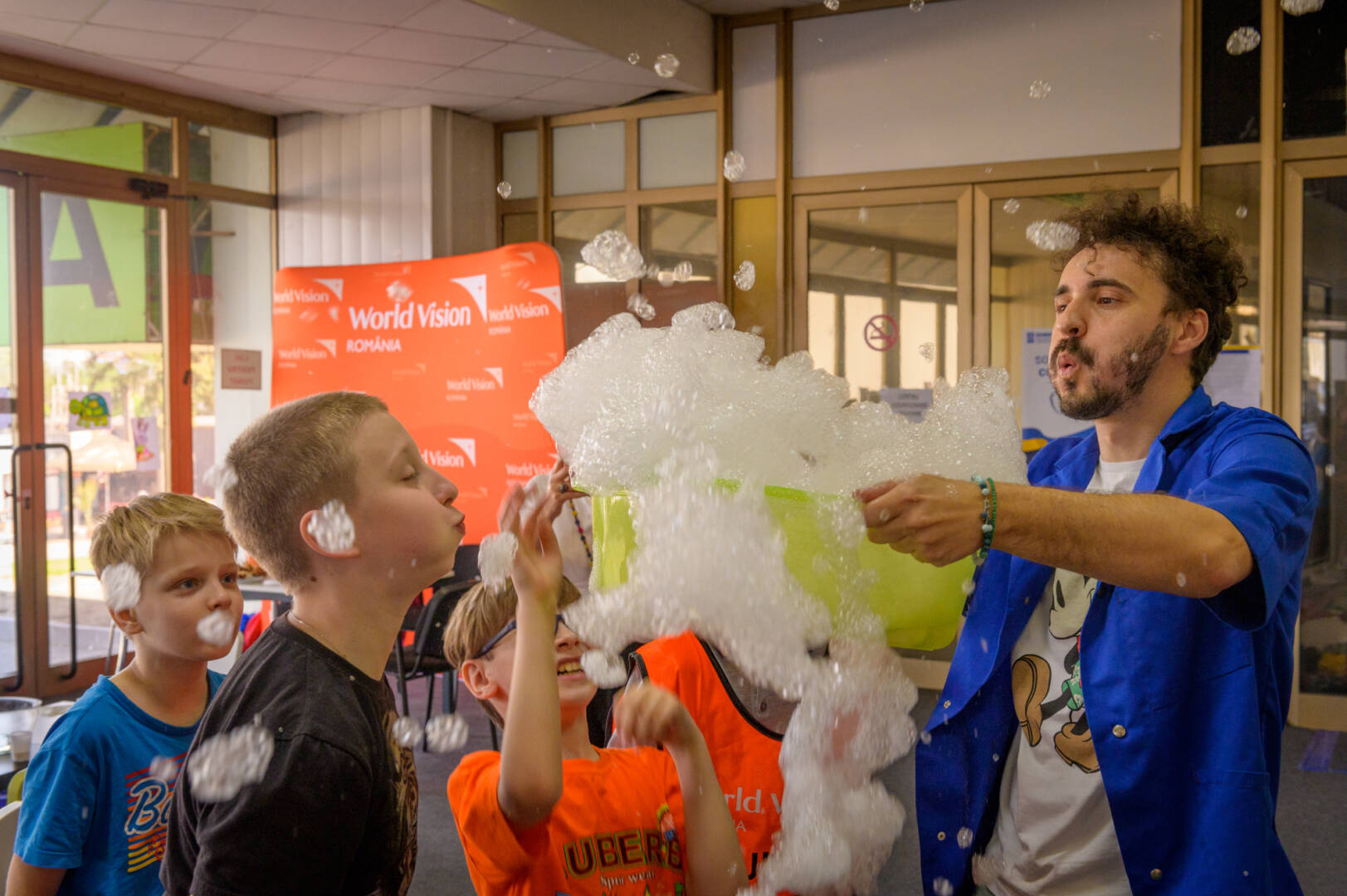
Peace of mind
As more refugees entered Romania from Ukraine, children’s entertainer Cristian Russ began delighting kids at Romexpo once a week, with his show becoming a high point for families.
Cristian regularly performs at birthday parties, so this was a completely new experience for him. “Here the people don’t expect to have fun. They come here for getting help,” he says. “Maybe this is the better way to make a surprise and give some joy to the people.”
Though he’s unable to speak Ukrainian, he noted that “fun has no language.” To get around the communication barrier, he pours his energy into big gestures.
He says, “When things are really tough, laughter can be a good route through. For children, and for everyone, it helps us to forget our struggles, even if it is for an hour, or even just 10 minutes.”
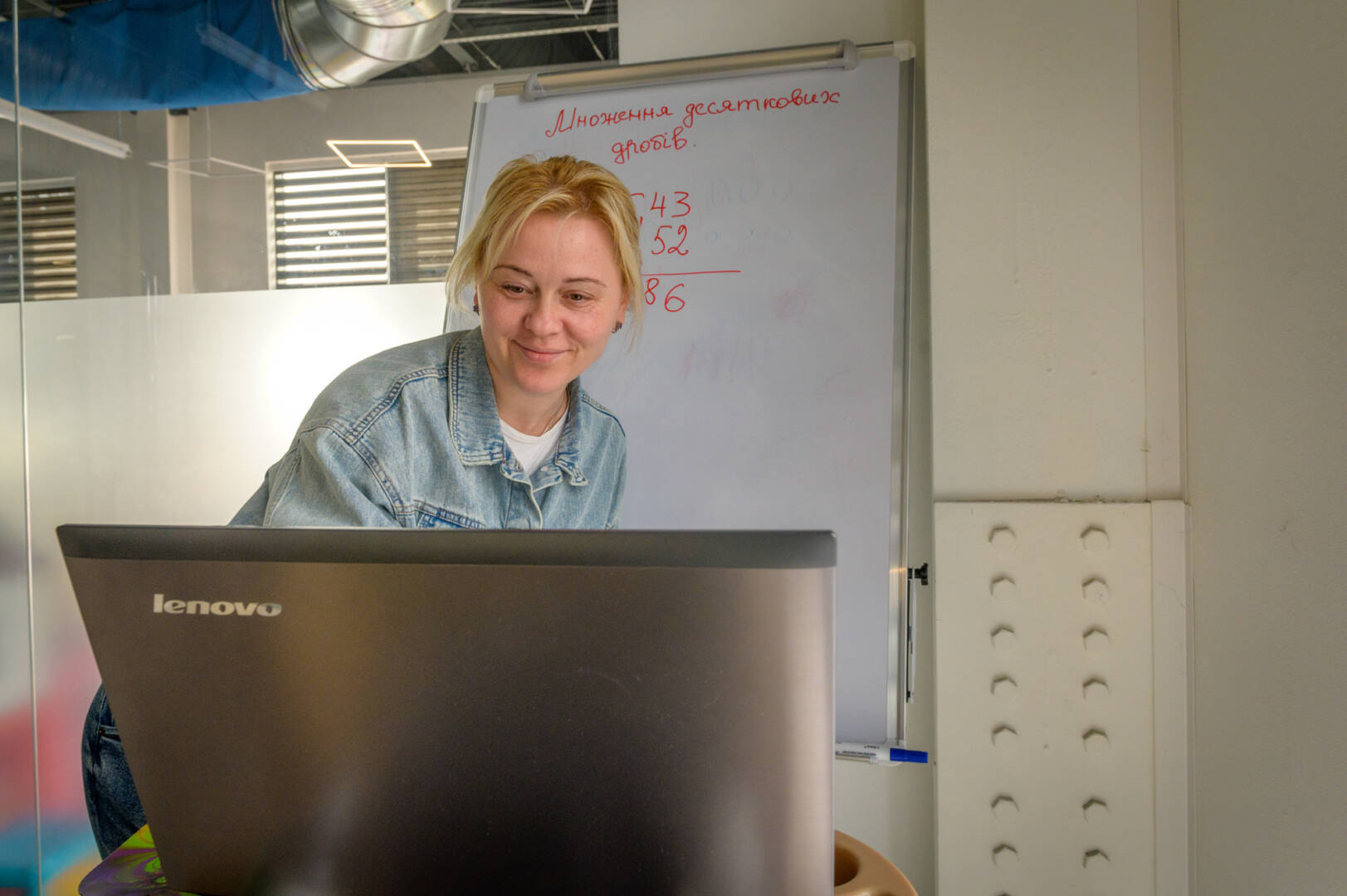
An island of safety
As a child, Natalia dreamed of being a teacher, but she ended up becoming an auditor instead. Six months before the war, she says, “I just decided that dreams from childhood should be true.”
At the age of 41, she made a 180-degree life change. She went back to school and, in October 2021, she started teaching math to fifth through seventh graders.
Little did she know that her life was about to change drastically once again as the war began in Ukraine.
She and her 15-year-old daughter, Kristina, fled Odesa the Thursday before Orthodox Easter. Bombs fell close to home two days after they left.
They found respite at a shelter in Iasi, Romania — a city bordering Moldova — that houses up to 450 people. World Vision pays for utilities such as electricity, gas, and laundry services, as well as all volunteer-related expenses. World Vision staff also offer anti-trafficking seminars, a critical resource for displaced women and children.
Natalia and Kristina left behind relatives, friends, and Natalia’s students.
Despite circumstances, Natalia hasn’t given up on her dream. Now she shares her love and lessons virtually with students from the shelter’s cafeteria.
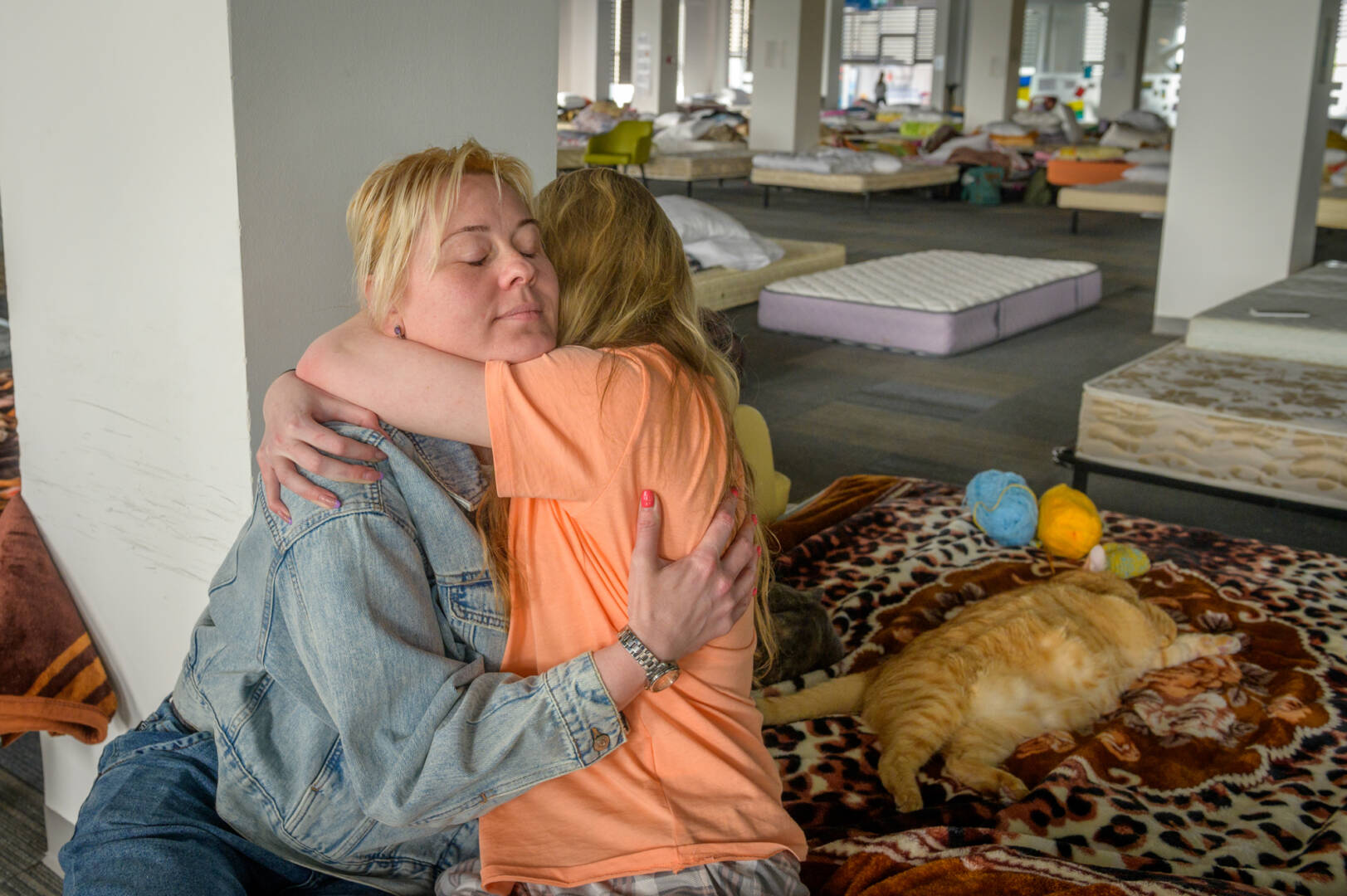
Kristina also continues her studies as she’s able. But it’s difficult because she’s struggling with the trauma of having to flee her home. She finds comfort in painting and knitting.
Natalia expresses gratitude for the shelter, which provides a roof over their heads and the food they need. She says, “It is an island of safety and the place of hope and calm.”
Changing needs and response
With the generous help of supporters around the globe, World Vision reached more than 116,000 people in need in the first 100 days of the war in Ukraine.
The war’s ever-changing landscape means World Vision’s work adapts to meet refugees’ evolving needs.
But ultimately the hope remains for the return of peace. “In New Zealand we have this phrase, tūrangawaewae,” says Mark Mitchell, whose regular role is with World Vision’s New Zealand office, as head of fragile contexts. “It means [in the Maori language] ‘a place to stand.’ And for all of us, we have a place where our heart belongs.”
For Ukrainian families, the support they’ve found outside their war-torn country gives them strength until they can go back to where their hearts belong.
